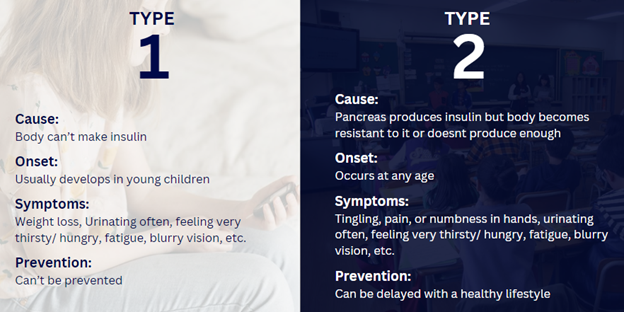
School Health
The CDPS is dedicated to empowering parents, and educators with the knowledge and tools necessary to manage diabetes effectively in the school environment. Below you will find a fact sheet, school guidelines for managing diabetes during school hours and more.
Explore our resources, and let’s work together to make school a safe and supportive place for every learner.

In the US there are 352,000 children and adolescents younger than age 20 who have been diagnosed with diabetes; of those, 304,000 have type 1 diabetes. Type 1 diabetes is a chronic autoimmune disease where the body does not produce insulin. Children with type 1 diabetes are required to take insulin every day. Type 2 diabetes is a chronic condition where the body does not produce enough insulin or does not properly use the insulin that is produced. Type 2 diabetes can be managed through lifestyle changes, including healthy eating and increased physical activity, along with prescribed medications.
Ensuring students with diabetes have the health services they need in school is important to their health and learning. Diabetes management is most effective with a strong support system of students, parents, teachers, counselors, and administrators. Support can come in many forms including assisting students in taking medications and checking blood sugar levels while at school. The student's support system is imperative to enhance their learning experience through assistance and support when needed.


The Georgia Department of Public Health’s Chronic Disease Prevention Section, in partnership with the Georgia Department of Education, has developed a fact sheet for parents that provides essential information on type 1 and type 2 diabetes, risk factors, and screening options for type 1 and type 2 diabetes. This fact sheet is designed to assist local school systems in providing information to parents and guardians of students on type 1 and type 2 diabetes, as required by House Bill 1183 enacted by the General Assembly of Georgia in 2024. Collaboration between students, parents, and schools creates a supportive environment that enables students to be healthy and safe to thrive and learn at school. Click the link below for PDF and printable versions.
Diabetes:
A guide for parents - English
Diabetes:
A guide for parents - Spanish

The purpose of these guidelines, published by the Georgia Department of Education and the Georgia Department of Public Health, is to enable schools to ensure a safe learning environment for students with diabetes. These materials are based on the belief that children with diabetes can participate in all academic and non-academic school-related activities. In order for children with diabetes to be successful in school, a comprehensive health plan must be collaboratively developed by families, students, school personnel, and licensed health care providers. The individualized health plan (IHP) implements the Diabetes Medical Management Plan (DMMP) provided by the healthcare provider, physician orders and provisions appropriate to each student’s needs during the school day and for other school-related activities. The IHP must be based upon and consistent with the DMMP. Click the link below for more information.
Guidelines for the Care Needed for Students with Diabetes
Additional Resources
Helping the Students with Diabetes Succeed: A Guide for School Personnel
DMMP how-to-use Webinar (Passcode 245823)
Sample Cover letter for schools to send DMMP to parents and providers
Last reviewed 10/1/2024